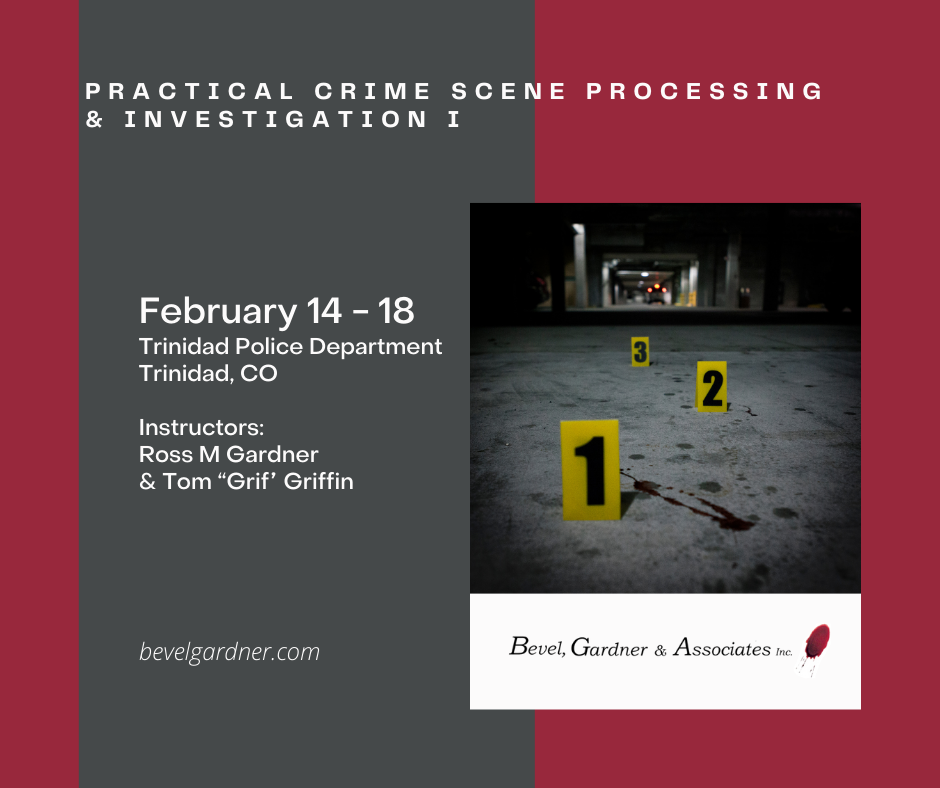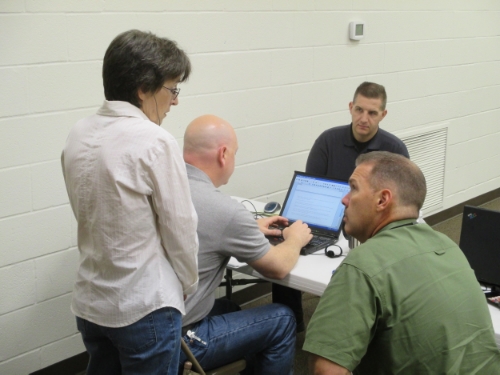Crime Scene Processing in Trinidad, CO and Upcoming Courses for spring 2022
Read MoreBlog
Bevel Gardner & Associates forensic consulting and education providing instruction across the country and around the world. Located in Oklahoma, we are the largest independent forensic consulting company in the US. Follow our blog.
New Year, New Training - Bevel, Gardner & Associates Expert Training Courses
The BPAPD program incorporates three distinct training courses of one week each. A Level I course introduces the student to bloodstain pattern analysis with significant concentration on basic pattern recognition and documentation. This Level II course concentrates on proper application of scientific method, experimental design and clothing examinations. Between the Level II and Level III course the student participates in a mentorship program. The mentoring program includes requirements for both case analysis and research design/completion. The Level III course includes a pre-course case analysis and then on-site course concentration on experimental design, and court room presentations.
Objectives:
Demonstrate the ability to use and apply scientific method.
Demonstrate the ability to apply experimental design in support of bloodstain pattern analysis.
Demonstrate the ability to evaluate bloodstain patterns on clothing.
Recognize and demonstrate how Luminol and LCV are used to enhance latent blood patterns.
Demonstrate the ability to evaluate a complex bloodstain pattern scene.
Demonstrate the ability to present bloodstain pattern analysis conclusions in a logical written format.
The course is intended to develop a fundamental knowledge of crime scene processing technique. The course will illustrate to the student the six basic activities of crime scene processing and the sequence of those activities. The course concentrates on these core concepts: assessing, observing, documenting, searching and collecting, but also includes lectures on advanced techniques such as alternate light source utilization, bloodstain pattern recognition and trajectory analysis. It will introduce the student to the function and role of crime scene analysis.
Objectives:
Demonstrate knowledge of the six basic activities involved in crime scene processing and the general order of these activities.
Recognize the general categories of physical evidence, what a crime laboratory can do with this evidence and accepted methods of recovery.
Demonstrate knowledge of the critical aspects of assessing a crime scene, including scene containment, crime scene team composition considerations, choosing the most effective crime scene search technique and scene hazard identification and mitigation.
Describe the different scene mapping methods.
Describe the three basic photographs utilized for crime scene documentation.
Describe and demonstrate the basic elements of crime scene narratives.
Recognize basic bloodstain patterns.
Discuss the function, theory and application of an alternative light source in crime scene processing.
Recognize the affect of effective crime scene documentation on crime scene analysis.
Describe basic methodologies of crime scene analysis.
LA IAI Annual Training Conference
Ross spent the 10 and 11th of June in Lake Charles, LA presenting two workshops for the LA IAI annual training conference. First up on Wednesday was a four-hour workshop on methodology for crime scene reconstruction. After a 1.5 Hr lecture, student participants were required to apply the concepts presented to evaluate an actual homicide case and decide if they could refute or corroborate a testimonial claim by a subject. On Thursday a shooting incident reconstruction (SIR) workshop was on the agenda. Once again, following a lecture, students were presented with a hypothetical police shooting and applying basic SIR concepts asked to refute or corroborate two different claims about the incident.
Students Sharpen Analysis Skills Through Crime Scene Reconstruction Class
This Crime Scene Reconstruction Level II course took place in Conroe, Texas.
Ross and Iris just completed a Level II Crime Scene Reconstruction course hosted by the Montgomery County Sheriff’s Office in Conroe, Texas. Class participants included primarily members of the MCSO Major Crimes Unit and the MCSO Crime Lab as well as students from the Plano Police Department and USAF Office of Special Investigations.
The Level II course concentrates on demonstrative evidence in support of crime scene reconstruction and includes evaluation of a major case. In the photos the students are developing their reports, demonstratives aids and investigative worksheets to support their major case analysis.
These students will now be able to demonstrate proper use of the Event Analysis technique to define objective information about a criminal incident. They will also be able to properly articulate their analysis to a jury.
Blood Pattern Analyst Professional Development Program
BLOOD PATTERN ANALYSIS
The examination of blood patterns found in a scene or on items recovered from the scene. The BGA Bloodstain Pattern Analyst Professional Development Program (BPAPD) is a cradle to grave program consisting of four parts. We feel it represents the most comprehensive study plan for bloodstain pattern analysts offered in the United States.
To properly train competent bloodstain pattern analysts, a comprehensive training program is required that leads the student from novice to competent analyst and ultimately to the status of expert. In the recent past, questions have been raised with regard to the technical training analysts receive, particularly within the United States.
Based on these concerns BGA has revised and expanded its bloodstain training curriculum beyond that found in the classic "Basic" and "Advanced" bloodstain courses. The BGA Bloodstain Pattern Analyst Professional Development Program (BPAPD) is intended to better meet the needs of both the student and the discipline.
NEXT TRAINING
To begin this training we are offering a Level I course in Denton, TX from April 20-24th. There are no prerequisites. This class offers 40hrs of professional instruction to develop a basic understanding of the discipline of BPA.
FUTURE DATES
Other Level I courses offered are in Idaho Falls, ID from June 15-19th and Colorado Springs, CO from July 6-10th.
HOST A TRAINING
Find out what you need to know to host a course of your own.
TO LEARN MORE ABOUT ALL CLASSES OFFERED
Learn more about out internationally renowned curriculum.








